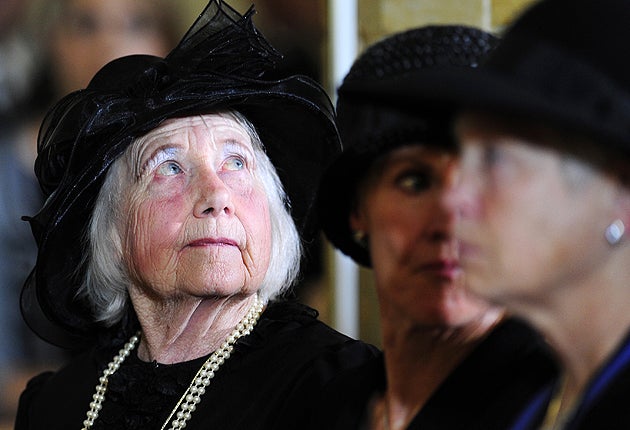Estranged daughter joins veteran Henry's send-off

Henry Allingham might not have cared much for all the pomp and ceremony at his funeral, the dignitaries and the fulsome tributes that flowed to one of the last survivors of the First World War. This, after all, was the man who when asked how he would like to be remembered replied that he did not want to be remembered at all. "I want to be forgotten. Remember the others."
He might, though, have been pleased to see the frail, elderly woman in black sitting in the front of the church for today's service. She drew no attention to herself, nor gave great outward show of mourning, but she would have known that the eyes of nearly everyone in the 14th century Brighton church would have been upon her: for she was Betty Hankin, the daughter who had not spoken to Henry for nearly 40 years. So long had their estrangement been that Henry used to say he thought she was dead.
With death came a rapprochement of sorts, not soon enough for a reunion between the living, but enough for 89-year-old Mrs Hankin to make the journey from her home in Gloucestershire to pay her last respects to the father who become a national symbol of the sacrifice of a generation.
She did not come alone. With her were several members of her family who, until last week, had no idea that they had a forebear who was held in such regard. The exact cause of the rift remains unclear - and perhaps the family has done nothing to deserve the private sadness of a family feud being made public - but Mr Allingham's lost family made up for the wasted years by turning out in force, right down to his 10-month-old great-great-grandson, Tyler Hankin.
Henry Allingham was, at the age of 113, the world's oldest man when he died on July 18 and, with Harry Patch, one of Britain's last two survivors from the Great War. Harry Patch died exactly week later, making Claude Choules, 108, who lives in Australia, the last living British veteran of the war.
His funeral was held with full military honours. The Duchess of Gloucester was there, in her capacity as president of the World War One Veterans Association, along with senior figures from the Royal Navy and Royal Air Force and the Veterans Minister Kevan Jones. On a day of singular honours for a singular man, his coffin - draped with the Union flag and covered with red roses - was, uniquely, carried by pallbearers from both the navy and the RAF. Behind them, from the American side of the family - his other daughter Jean, now dead, was a GI bride - his great-grandsons Brent and Michael Gray, both petty officers in the US Navy, carried his medals and decorations into church.
At the end of the service the bells of St Nicholas's tolled 113 times, once for each year of his life, and five replica World War One planes - Mr Allingham was the last surviving member of the Royal Naval Air Service, and a founder member of the Royal Air Force - performed a flypast.
There was, however, more to Henry Allingham than longevity and luck, and the crowd that gathered by the church - a thousand or more, from children to old men festooned with medals - to watch the service on the screen outside was testament to the way Mr Allingham spoke to all generations.
His friend Vice Admiral Sir Adrian Johns said that by talking about the war Mr Allingham performed an invaluable service. "He blew the dust off the history books for us. He breathed life into our heritage and reminded us of those who had gone before and those who had made the ultimate sacrifice."
He was also, as another friend, Air-Vice Marshal Peter Dye, told the congregation, a reminder that old age need not be seen as a disability. "I never knew someone with such an appetite for life," he said. "I watched Henry at the age of 110 conga round a French dance floor in his wheelchair. When his slipper flew off into the corner I was struck by how much he simply enjoyed living."
He also had a mischievous side - "and, I'm told by the ladies, a certain charm." Once, during a visit to the House of Lords, he said, "Black Rod was somewhat surprised when Henry, having struck up a warm conversation with his secretary, asked for her phone number."
Subscribe to Independent Premium to bookmark this article
Want to bookmark your favourite articles and stories to read or reference later? Start your Independent Premium subscription today.

Join our commenting forum
Join thought-provoking conversations, follow other Independent readers and see their replies